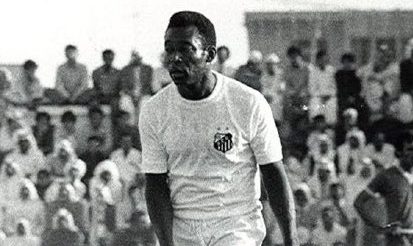Pelé is survived by his children and grandchildren, and will be remembered as a true legend of the beautiful game.
Edson Arantes do Nascimento, better known as Pelé, has died aged 82, agent Joe Fraga confirmed on Thursday.
The Brazilian footballer widely regarded as one of the greatest players of all time, was diagnosed with cancer and has been hospitalised since late November.
In a statement last week, doctors at the Albert Einstein hospital in Sao Paulo said his cancer worsened due to “kidney and cardiac dysfunctions”.
“Everything we are is thanks to you. We love you infinitely. Rest in peace,” his daughter Kely Nascimento wrote in a tribute post on Instagram.
Pelé is survived by his children and grandchildren, and will be remembered as a true legend of the beautiful game.
King of football
Born on October 23, 1940, in Três Corações, Brazil, young Pelé grew up in poverty, and used to polish shoes to help contribute to the family income. The boy showed great interest for, and talent in, football following in his father’s footsteps and playing for a local minor league club when he got his first break.
The 11-year-old Pelé caught the eye of Waldemar de Brito, a premier player of the nation. Brito is said to have presented Pelé to skeptical directors at Santos, boldly stating that Pelé would be the greatest football player in the world. Whether or not he truly believed in his passionate statement at the time he made it remains immaterial.
Pelé proved himself to Santos when, at the age of 16, he scored a goal in his debut match, against rivals Corinthians FC.
“My father always told me, ‘don’t worry when you step on the pitch, be confident, because on the pitch everyone is equal’,” he said after being asked if he felt the pressure at a young age “And, that gave me a lot of strength.”
Soon after, the world began to sit up and pay attention when a 17-year-old Pelé scored a whopping 6 goals during the 1958 World Cup, thereby leading the Brazil National Team to victory. Brazil won its first World Cup that year.
With word of his brilliant performances spreading like wildfire, and a wide range of sports clubs showing unmasked interest in having Pelé play for them, Brazil declared its star soccer player a national treasure, thereby barring Pelé from playing for any non-Brazilian club or corporation.
Pelé was a spectacle when on the field, with his agile 5 ft. 8 inches frame swiftly running across the arena, his deft feet expertly dribbling the ball. Besides being hailed for his extraordinary command on the ball and powerful kicks, Pelé also commanded admiration for his powerful head shots.
In 1962, Pelé was unable to play alongside his team during World Cup as he sustained severe injuries during the first match of the tournament. However, in 1970, Pelé led his team to win what would be the 3rd World Cup for his nation.
He continued scoring a frenzy of goals getting his tally at 1,279 including friendlies – a record that would probably stand for the rest of history.
After he retired, Pelé returned to football for a short span of 2 years to promote it in North America. He played in the North American Soccer League to attract the interest of millions of Americans towards the “beautiful game”.
He played an exhibition game between Cosmos and Santos, playing for the former during the first half, and for the latter team during the second half. He used his popularity to spread the message of love and peace among the followers of the game, and had crowds chanting “Love! Love! Love!” during the exhibition match.
Pelé’s achievements on the field earned him numerous accolades. Most important of which, he was named Athlete of the Century by the International Olympic Committee and was inducted into the Brazilian Football Museum Hall of Fame and the National Soccer Hall of Fame.
In addition to his success on the field, Pelé was also known for his outstanding sportsmanship and his ability to bring people together through the universal language of football. He was admired by fans and fellow players alike for his humble demeanor and his dedication to the game.
Ronaldo Nazário once said this about him, “For Brazilians, speaking about Pele is speaking about an entity, speaking about something far superior to everyone.”
Off the field, Pelé was known for his philanthropy and his work to promote peace and social justice. He was a goodwill ambassador for the United Nations and worked with various charities to support children and the disadvantaged. He also wrote several books, including an autobiography and a memoir, and appeared in numerous films and television shows.
Pelé’s impact on the world of football cannot be overstated. He paved the way for future generations of players and inspired countless fans around the globe with his incredible talent and passion for the game. He will be deeply missed by the football community and remembered as one of the greatest players to ever grace the pitch.
Three time Ballon-dor winner Michel Platini once described the reverence towards Pelé “There’s Pele the man, and then Pelé the player. And to play like Pelé is to play like God.”







